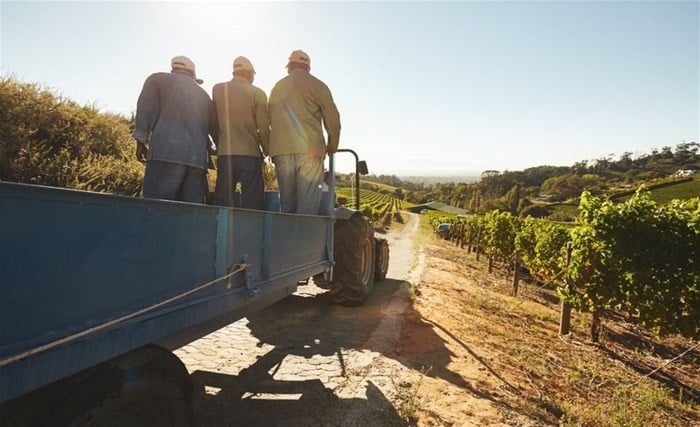
Subscribe & Follow
#AfricaMonth
Jobs
- Senior Digital Designer Cape Town
- Cashbook Accountant Cape Town
In the news
Safeguarding the well-being of SA's agricultural workers
"It has been proven that the sector is essential to post-Covid-19 economic recovery, but the health of workers will need to be safeguarded, as their contribution will be key to the role the sector has to play," says Dr Kobus Laubscher, agricultural economist and independent consultant to Agility Agri.

"Proper communication about the virus, health and wellbeing is necessary. No farm is an island; suppliers, co-operatives, distribution and agri-processing businesses are all deeply reliant on one another, and to protect the industry employers in agriculture must become more assertive and should require testing as soon as a worker shows visible signs of possible infection," says Laubscher.
"Farmworkers may choose not to communicate signs of possible Covid-19 because they may be afraid of losing their jobs. Hence farmers must take the lead in ensuring the health status of the farm stays intact. Prevention will always be better than cure.
"The pandemic exposed decades of insufficient investment, mounting workforce limitations and inadequate capacity. If we fail to close the healthcare gaps between the haves and have-nots in the country, we will further risk humanitarian and economic damage," Laubscher says.
Adressing human capital risks
"Pre-Covid-19 challenges have not evaporated either. Employers in the wider agricultural industry need to take note that many of the most pressing threats to their businesses stem from human capital risks. Taking care of the health and wellbeing of staff is essential, as they are invaluable to the survival of individual businesses, as well as to agriculture’s role in the national economic rebuild," Laubscher expands.
Dr Jacques Snyman, medical director of Agility Health, says that an integrated approach is needed to manage human capital risks more effectively.
"Often the need for higher levels of care, such as hospitalisation, can be avoided when a person is kept well with benefits that encourage them to access healthcare early on when they need it in a properly coordinated and integrated manner.
Adopting an integrated approach
"Covid-19 highlighted the importance of the employer being aware of the wellbeing of everyone involved in their organisation and making provision to ensure their wellness, as this is essential for collective on-going productivity and improved odds of success," Dr Snyman says.
For this reason, companies should adopt an integrated approach to human capital risk management and employee benefit solutions specifically tailored to the South African agriculture sector. "When comprehensive health cover products and services are bought from different providers who administer products using different systems, this often incurs additional costs and involves more complicated claims processes. For agricultural employers who are looking to see maximum return on investment, integrated solutions should be designed in such a way that they eliminate duplication of cover to deliver strong productivity and bottom-line results," Snyman adds.
"The pandemic emphasised that local supply remains essential, and one can expect a more decisive grip on import substitution while agricultural exports will also grow. Now the sector has to answer to the strategic intent of creating more jobs. Support to encourage local value addition instead of exporting unprocessed products and importing final demand goods is vital," Laubscher notes.
Creating a stronger business synergy
According to Dr Snyman, a bigger picture view of agriculture is key to creating stronger business synergies. "Supporting improved productivity and wellbeing has the greatest impact when no one is left behind. For agriculture to optimally prosper, every business that supports farming or beneficiation of produce should prioritise their greatest asset: their staff."
"The world of work is changing fast – and mapping out healthy new work models will be necessary to channel that change into the creation of stronger labour markets and sufficient safeguards. The most successful approaches will take into account shifting demographics and changing job roles, and will leverage disruption to best serve everyone’s needs," Laubscher says.
Laubscher believes it will be critical for South Africa to carefully review existing safety nets in order to prevent labour market changes from worsening inequality, and to better ensure the efficiency and utility of worker benefits, including healthcare cover.
"Current systems vary in terms of balancing the responsibility for workforce protection between governments and employers. The government provided social safety nets, but from a system point of view, there are clear signs that they are outdated. Meanwhile employer-based insurance systems for health and social protection become increasingly important for facing these new challenges and covering the gaps.
"Agriculture, and South Africa, cannot afford to wait," concludes Laubscher.
Related
Global shifts in focus as Nampo 2025 champions farm resilience 14 May 2025 From the ground up: How soil health unlocks greater yields for small-scale farmers 12 May 2025 China bans South African beef imports amid FMD outbreak 12 May 2025 South Africa's wine industry shines with 2025 vintage 8 May 2025 Western Cape renews MoUs to support new farmers 7 May 2025 Entries open for inaugural South African Preserve Championships 6 May 2025










